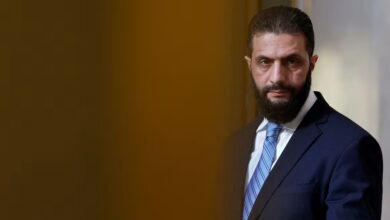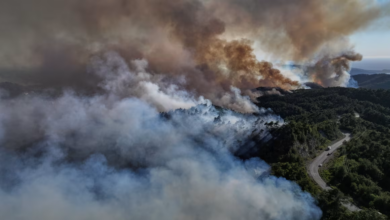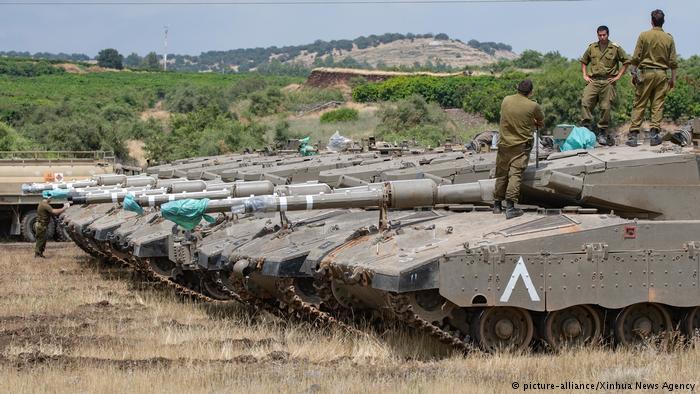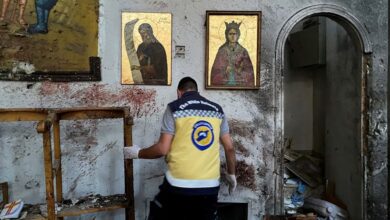AMMAN, Jordan – Syrian tanks occupied the main square in central Hama Wednesday after heavy shelling of the city, residents said, taking control of the site of some of the largest protests against President Bashar al-Assad.
Human rights campaigners say more than 90 people have been killed in Hama since Assad unleashed a military assault on Sunday to regain control, triggering international condemnation and calls from US senators for sanctions on Syria's energy sector.
At the United Nations, a diplomat said the Security Council had "substantially agreed upon" a draft statement that would condemn human rights violations and use of force against civilians by Syrian authorities. The council diplomat said the statement could be adopted later Wednesday.
Wednesday's push into the heart of the city coincided with the opening of the trial in Egypt of former President Hosni Mubarak, toppled by an uprising which shook the Arab world and inspired the protests against Assad.
"All communications have been cut off. The regime is using the media focus on the Hosni Mubarak trial to finish off Hama," one resident told Reuters by satellite phone from the city.
He said tanks and military units including paratroopers and special forces were seen moving to the central Orontes Square from the south, accompanied by militia known as 'shabbiha'.
Residents said shelling concentrated on al-Hader district, large parts of which were razed in 1982 when Assad's late father President Hafez al-Assad crushed an armed Islamist uprising, killing thousands.
A Syrian pharmacist who managed to talk with her family in the city told Reuters that they had tried to flee but that the 'shabbiha' were randomly shooting residents. Several buildings in Hama had caught fire from heavy tank shelling, with snipers seen deploying on rooftops in Orontes Square, she said.
The Local Coordination Committees grassroots activists' group said in a statement the authorities were trying prevent any news from emerging on the ferocity of the assault. The group could no longer contact its members in Hama.
"Communications have been totally cut off in Hama, together with water and electricity. There is a big movement of refugees trying to flee the city," the statement said.
Authorities say the army has entered Hama to confront gunmen who were intimidating residents. State television broadcast footage of armed men in civilian clothes who it said had attacked security forces and government buildings.
Syria has expelled most independent media, making it difficult to verify accounts from activists and authorities.
The plight of Hama has prompted many Syrians to stage solidarity marches since the start of the holy month of Ramadan Monday.
But Assad's response suggests he will resist calls for change that have swept Syria and much of the Arab world, and has led to Western calls for tougher international measures.
US Senator Mark Kirk said Tuesday the United States should impose crippling sanctions in response to the killing of civilians by troops under orders from Assad.
Kirk, a Republican, was introducing legislation in Washington to target firms that invest in Syria's energy sector, purchase its oil or sell gasoline.
His bill was also sponsored by Democratic Senator Kirsten Gillibrand and independent Senator Joseph Lieberman, who said it was time to push for "a democratic transition that reflects the will of the Syrian people."
Washington says Assad has lost legitimacy and has imposed sanctions on the president and his top officials, but has stopped short of directly calling on him to leave office as it did to Mubarak and Libya's Muammar Qadhafi.
Western officials fear instability in Syria and the wider Middle East if protesters oust Assad, whose family has ruled for four decades and kept Syria's frontier with the Israeli-occupied Golan Heights quiet despite its anti-Israel alliance with Iran.
The White House slightly hardened its stance against Assad Wednesday, saying the United States viewed him as the cause of instability in the country.
"Syria would be a better place without President Assad," White House spokesman Jay Carney said at a news conference.
OIL OUTPUT STEADY
The state news agency SANA said oil production in the first half of the year had risen marginally to 387,000 barrels per day, suggesting the unrest has had little impact on output. Around 40 percent of the oil was exported, earning vital revenues for an economy hit by a sharp fall in tourism.
Human rights campaigners said the assaults by Assad's forces across Syria Monday and Tuesday had killed at least 27 civilians, including 13 in Hama. That brought the total to about 137 dead throughout Syria since Sunday, 93 of them in Hama, according to witnesses, residents and rights campaigners.
Turkish Deputy Prime Minister Arinc Bulent, whose country had grown close to Assad in recent years, issued the strongest condemnation yet of the Syrian president by a Turkish leader.
"I'm saying this on my behalf, what's going on in Hama today is an atrocity…Whoever carries this out can't be our friend. They are making a big mistake," he said.
"We insisted on democratic and peaceful solutions and starting reforms. We told them they would collapse otherwise…recent events show no lessons were learned from these suggestions," he told reporters.
At the United Nations Russia and some other countries had sought a statement that would blame both Syrian authorities and the opposition for the violence, but Western nations say the two sides cannot be equated.




